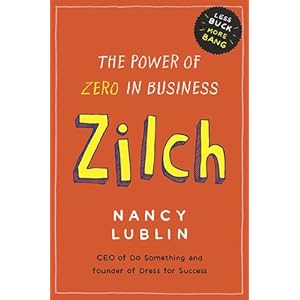|
EXCERPT FROM ZILCH

The following is an excerpt from Nancy Lublin's new book Zilch: The Power of Zero in Business. Nancy founded Dress for Success and is now the CEO of DoSomething.org [she is also on Feminist.com's Advisory Board]. The book draws on those experiences--and interviews with other not-for-profit leaders to cull management lessons that can be applied to big business. Here is what she has to say about "doing more with less" with your Board of Directors and adjusting your selection criteria.:
Adjust your selection criteria.
The problems start when you’re looking for board members. At worst, corporations seek board members with the biggest names, the people who will impress shareholders, or the CEO’s golf buddies. The fancy firm you’ve hired to find good candidates wants to impress you with the stature of their list. The pool of candidates is often ridiculously, incestuously small. Take a quick flip through a pile of Fortune 500 annual reports. You’ll see a lot of retirees—former this and ex that. This is the corporate board as career pasture. CEOs tout their board members’ vast past experience, but how about current network? Are they connected to the latest trends in technology—or do they still refer to the Internet as the World Wide Web? Why do so few boards in the for-profit world have what many not-for-profits seek—people who are younger, more innovative, more primed for networking, hungrier?
As you peruse the group photos of corporate boards, you’ll also notice the tokenism and how the same faces repeatedly crop up to fill the de rigueur woman and minority slots. At a conference two years ago I heard Laura d’Andrea Tyson, the Clinton administration official who now teaches at UC –Berkeley’s Haas School of Business, speak about the “male and pale” syndrome that afflicts corporate boards. Tyson, who sits on the boards of Morgan Stanley, AT&T, and Eastman Kodak, is right. According to an article in Fortune, women occupy only one out of every six company directorships. Being that women make up half the population, that seems a bit disproportionate, no? Even companies that talk about diversity as a priority don’t apply that principle to their corporate board membership. Chrysler has an explicit corporate diversity policy, but its board is lagging. Some industry observers have described its board as “a male frat party at the Vatican” and “a white polar bear in an igloo.” To Tyson’s denotation of male and pale, I’d also add stale. Most of these board members are old!
The question is, how does this happen? One reason is basic human nature. We tend to gravitate to people who are like us, not just in race and age but in so many other ways, from schooling to career to club affiliations. Another reason is the homogeneity of the upper echelons of the corporate world—big companies want board members with extensive big-company experience and accomplishment, and these people tend to be older white males. To their credit, some companies are making a more active effort to select more diverse boards, just as corporate America is striving for more diverse management, but the progress is slow, as some still need to be convinced that it’s a valuable priority.
It’s not that I don’t like old white guys; it’s that I don’t think any kind of homogeneity is helpful. If the board is entirely young black women or middle-aged Greenwich Connecticuters or any other like-minded group, then the board will be limited in its ability to help the organization question, stretch, learn, grow, and succeed.
There will always be some cronyism in board selection. It happens all the time in the not-for-profit world too. Of course we pull in people we know. Of course we try to recruit our friends. But ultimately my organization isn’t going to be helped by a board member who looks just like me. I’ve already got the downtown New York working-mom thing covered. I need people who can work other circles. A board is really a collection of individuals, and each needs to pull their own weight. As Peter Wilderotter, the head of the Christopher and Dana Reeve Foundation, likes to say, "It’s only a board when you bring them together. Most of the time you’re working with these people as individuals, so you need each of them to bring something to the table."
I’ve always been highly conscious of the need to bring in board members with complementary skills. If my organization has fifteen board members who all are good at raising money from a single source and none has any expertise in strategic development, that won’t do us much good. If we’re heavy on board members who can provide advice on communication, of course we avoid bringing in a new board member with the same expertise.
Kate Roberts, the head of YouthAIDS, recently shared with me that she was looking for a board member at a senior level in the media or advertising world. She’s working on the launch of an important new initiative and hopes to find someone who can help direct the strategy, tone, and execution of a multimedia campaign. As we spoke, it occurred to me that if she hadn’t said the words “board member,” we could have been talking about a typical staff opening, about filling a hole and meeting a skill need on the team. Not-for-profit board members are like senior staff who won’t be in the office every day or even every week and will never get a paycheck from the organization.
* * *
Excerpted from ZILCH: THE POWER OF ZERO IN BUSINESS by Nancy Lublin by arrangement with Portfolio, a member of Penguin Group (USA), Inc., Copyright (c) Nancy Lublin, 2010. * * *
Related links
Buy Zilch
DoSomething.org
Dress for Success
Click below to e-mail this article to a friend
or to post a link on your favorite sites.
Thank you!
 |
|
